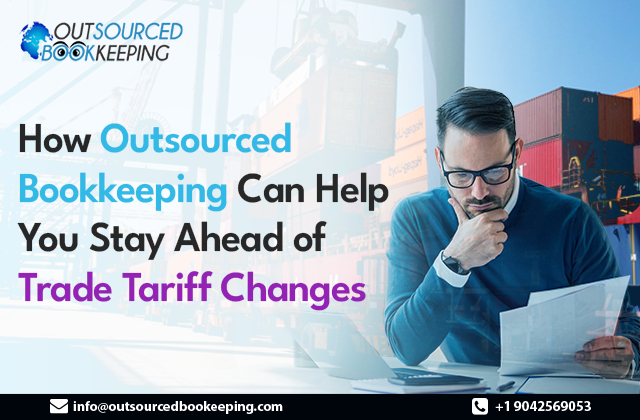The 2025 trade environment has presented business owners with a fresh wave of challenges, particularly due to evolving import tariffs and stricter customs regulations. With trade tariff changes now influencing everything from product pricing to inventory costs, accurate and adaptable financial management is no longer optional – it’s essential. In this dynamic scenario, outsourced bookkeeping has emerged as a valuable resource for helping businesses respond effectively to global trade shifts.
As tariffs increase and compliance requirements grow more complex, businesses need real-time financial clarity and adaptive strategies. This is where the expertise of outsourced bookkeepers can play a pivotal role in safeguarding margins and strengthening operational resilience.

Why Bookkeeping Needs to Evolve with Trade
Traditional accounting procedures are not very efficient when it comes to changes in policies that occur frequently. Manual data entry, delayed reporting, and integration of systems hinder organisations from adapting to new tariffs and customs procedures.
This is where the concept of outsourced bookkeeping for tariff changes becomes a strategic advantage. With the help of experienced specialists in the field of international accounting, companies can receive timely information on how tariffs affect their revenues. Outsourced bookkeepers have the tools and knowledge to update records as soon as possible, track changes, and offer forecasting tools that are in line with the new tariff conditions.
Real-Time Monitoring and Reporting
Another advantage of outsourcing is the ability to receive reports on the financial situation in real time. Through trade tariff changes with bookkeeping business owners can monitor imported goods, record the landed costs (including tariffs), and make necessary adjustments to their budgets.
This level of detail makes sure that decisions are made based on the most current information as it is gathered. For instance, if there are sudden changes in tariffs on steel, then bookkeepers can easily adjust that in the inventory, gross margin, and future orders. This assists business organisations in making the right decisions on the price to set, the suppliers to deal with, and the right time to procure.
Strategic Budgeting with Expert Support
The tariffs are becoming more complex. Thus, the a need to have a dynamic budgeting system. Scheduling must also provide insight into how new responsibilities will impact various types of products, logistics costs, and vendors.
How outsourced bookkeepers help with tariff budgeting is by developing models that take into consideration fluctuations in tariff rates and customs fees. They include various situations (like fluctuations in demand during the year or changes in the supplier’s terms) and assist in determining other factors that act as a safety net in case of an unfavourable occurrence.
These budgeting models are also very adaptable and can be easily changed as soon as new trade tariff changes are implemented. This characteristic is particularly valuable in an unpredictable environment where organisations have to be ready for any scenario.
Bookkeeping Strategies for Tariff Management
The following are some of the best bookkeeping strategies for tariff management. First, outsourced bookkeepers make sure that all import costs (tariffs, customs duties, freight charges) are correctly coded in the accounting system. This helps prevent over- or under-estimation of profits, which may lead to wrong figures and tax issues.
Second, they assist in synchronizing the accounting treatment with the supply chain management strategy. For instance, companies that purchase many products for the holiday season require the costs to be properly reflected in the inventory for the purpose of pricing and promotion.
Third, they make sure that all documentation is comprehensive and in a state that can be audited. Since trade tariffs have become more stringent, each shipment must be accompanied by documentation to justify the entries in the financial books and meet the requirements of the authorities.
Through the consistent use of these strategies, outsourced bookkeepers ensure that there is order in the financial books and assist in the provision of information that can help in decision-making across the departments.
Supporting Long-Term Trade Planning
It is important to note that the duties of bookkeepers are not limited to the management level alone. They also give information that is useful in strategic planning for the future. When evaluating potential suppliers or entering new markets, the cost of tariffs becomes a factor to consider.
Outsourced bookkeepers can also use historical data to identify trends in tariffs, seasonal variations, and supplier performance. This intelligence helps the business owners to ensure that trade strategies are in line with financial objectives, while at the same time avoiding risks that may hinder growth.
Furthermore, when the technical work of accounting is outsourced to an external vendor, internal teams are able to concentrate on more strategic activities like sourcing strategies, market analysis, or customer relations.
Final Overview: A Smarter Way to Manage Tariff Disruption
Trade tariffs are no longer events that happen once in a while; they are becoming more frequent in the global market. Those who fail to take this into account are likely to lag in the market competition.
Those who invest in strategic financial management prepare themselves to be in a better place to manage the changes. In this case, it is possible to turn uncertainty into opportunity through the use of bookkeeping services for trade tariffs.
Outsourced bookkeeping is no longer a mere administrative function but a strategic tool in trade reporting and planning if done with timely reporting, detailed planning, and compliance assurance. Whether it is a short-term adaptation or a long-term strategic plan, having professional help means that your business is always ready for the changes in trade relations.








